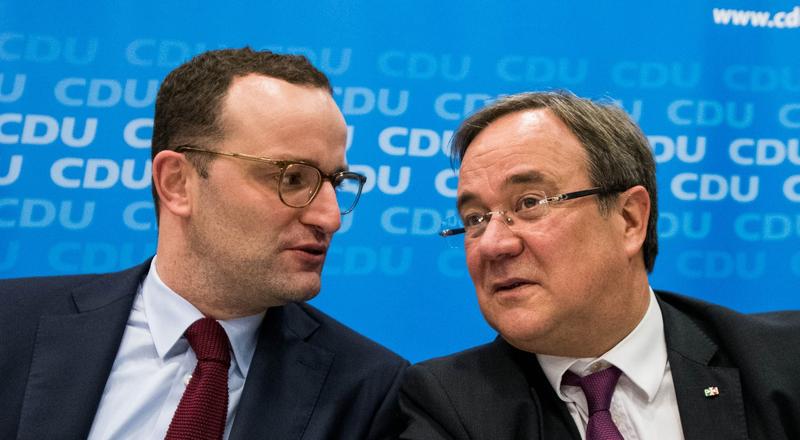 In this Nov 6, 2018 photo, Jens Spahn (left), current German Health Minister and leading member of the German Christian Democrats (CDU), and Armin Laschet (right), Prime Minister of North Rhine-Westphalia, attend a meeting of the CDU North Rhine-Westphalia state parliamentary group in Dusseldorf, Germany. (PHOTO / GETTY IMAGES / BLOOMBERG)
In this Nov 6, 2018 photo, Jens Spahn (left), current German Health Minister and leading member of the German Christian Democrats (CDU), and Armin Laschet (right), Prime Minister of North Rhine-Westphalia, attend a meeting of the CDU North Rhine-Westphalia state parliamentary group in Dusseldorf, Germany. (PHOTO / GETTY IMAGES / BLOOMBERG)
A moderate in Angela Merkel’s mold became the clear front-runner to replace her after a vocal conservative contender backed his bid to lead the Christian Democratic Union.
We can and we must bring our party and our country together again. That’s why I want to run as leader of the CDU.
Armin Laschet, premier of North Rhine-Westphalia
Armin Laschet, 58, the premier of North Rhine-Westphalia, won the support of Health Minister Jens Spahn, 39, a move that would likely ease pressure on the German leader to step down early.
By uniting centrist and conservative factions in the party, the duo threatens the ambitions of Friedrich Merz, a long-time Merkel antagonist considered the biggest risk to the chancellor.
“We can and we must bring our party and our country together again,” Laschet, 58, said during a joint press conference with Spahn. “That’s why I want to run as leader of the CDU.”
ALSO READ: Merkel's CDU sets April 25 congress to pick new leader
After having his political career eclipsed by Merkel even before she became chancellor, Merz stormed back onto the political scene in 2018 in an attempt to take control of the party, only to be thwarted in a tight race. This might be the 64-year-old’s last chance, and he plans to go for it.
“As of today, we have an open competition in the CDU,” Merz said, criticizing Laschet as the candidate of continuity while saying he stands for renewal. “I am playing for the win.”
The start of the eight-week contest to become party leader -- and in all likelihood the CDU’s chancellor candidate for the next election -- will determine whether Merkel can see out her final term, which is due to end in the fall of 2021. Delegates will vote on the next leader of Germany’s strongest party at a special convention on April 25.
Laschet and Spahn indicated that they won’t put pressure on Merkel to leave early, but Laschet noted that while he looped in the Bavarian sister party of the alliance, the chancellor wasn’t informed of the deal in advance.
“Our candidacy is not directed at Angela Merkel,” said Spahn. “It’s not about a break, and it wouldn’t succeed anyway. It’s about learning to walk after 15 years of Angela Merkel’s chancellorship.”
 Jens Spahn (left), Minister of Health, and Armin Laschet (second from left, both CDU), Prime Minister of North Rhine-Westphalia, comment on a possible candidacy for the CDU presidency at a press conference, Feb 25, 2020. (PHOTO / PICTURE ALLIANCE VIA GETTY IMAGES / BLOOMBERG)
Jens Spahn (left), Minister of Health, and Armin Laschet (second from left, both CDU), Prime Minister of North Rhine-Westphalia, comment on a possible candidacy for the CDU presidency at a press conference, Feb 25, 2020. (PHOTO / PICTURE ALLIANCE VIA GETTY IMAGES / BLOOMBERG)
Far-right fallout
The surprise alliance between two of the leading contenders reflects the turmoil sweeping through the party in the aftermath of a state chapter’s decision to break ranks and throw its lot in with the far-right Alternative for Germany. The fallout led to the resignation of Annegret Kramp-Karrenbauer as CDU chief two weeks ago.
“We, as the CDU, are in the biggest crisis of our history, a crisis of trust, solidarity and confidence,” Spahn said. “Armin Laschet and I sometimes had our differences in the past, but that’s what it’s about in a people’s party: building bridges between different positions and different generations.”
For Germany the stakes are high. The CDU has to deal with the challenge from the far-right, French demands for European integration, and the twilight of an economic era which saw its manufacturers go from strength to strength.
Support for Merkel’s bloc held at 26.5 percent in the latest Insa poll for Bild newspaper published Tuesday, with the Greens gaining 1.5 percentage points to 22 percent and the Social Democrats steady on 14.5 percent. By comparison, the CDU-led bloc secured 32.9 percent of the vote in the 2017 election.
Kramp-Karrenbauer -- Merkel’s chosen successor -- had planned to stick around until year end, but she was forced to accelerate the process as unrest swirled around the party. A disastrous election result in Hamburg on Sunday underscored the need for urgency.
Leadership claim
With Spahn refraining from running, the main contest pits Laschet against Merz. Norbert Roettgen, 54, who was fired by Merkel as environment minister in 2012, has also entered the race but is seen as an outsider. He announced on Twitter that he planned to bring a woman onto his ticket.
Spahn criticized Merz’s decision to pursue his own candidacy and not support a unified ticket under Laschet.
“We both have a great deal of respect for Friedrich Merz,” said Spahn. “But what we need right now is solidarity and unity in the party and that’s why I have decided to support Armin Laschet.”
READ MORE: Merkel succession battle heats up with surprise new candidate
Merz fired back, likening the Laschet-Spahn alliance to a “cartel” designed to weaken competition. But he said he wasn’t backing down.
“I have always worked in teams and never alone. And it was completely clear to me that I would also work in a team this time, but a team must be led and needs a leader,” said Merz. “I want to win.”


